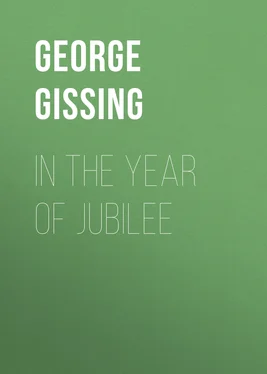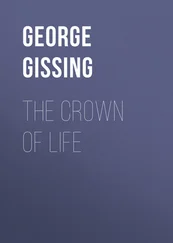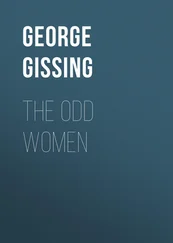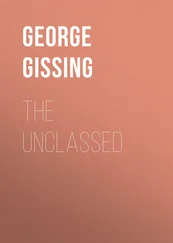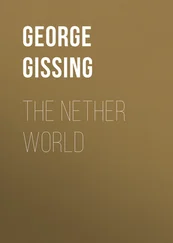George Gissing - In the Year of Jubilee
Здесь есть возможность читать онлайн «George Gissing - In the Year of Jubilee» — ознакомительный отрывок электронной книги совершенно бесплатно, а после прочтения отрывка купить полную версию. В некоторых случаях можно слушать аудио, скачать через торрент в формате fb2 и присутствует краткое содержание. Жанр: foreign_prose, literature_19, foreign_antique, на английском языке. Описание произведения, (предисловие) а так же отзывы посетителей доступны на портале библиотеки ЛибКат.
- Название:In the Year of Jubilee
- Автор:
- Жанр:
- Год:неизвестен
- ISBN:нет данных
- Рейтинг книги:4 / 5. Голосов: 1
-
Избранное:Добавить в избранное
- Отзывы:
-
Ваша оценка:
- 80
- 1
- 2
- 3
- 4
- 5
In the Year of Jubilee: краткое содержание, описание и аннотация
Предлагаем к чтению аннотацию, описание, краткое содержание или предисловие (зависит от того, что написал сам автор книги «In the Year of Jubilee»). Если вы не нашли необходимую информацию о книге — напишите в комментариях, мы постараемся отыскать её.
In the Year of Jubilee — читать онлайн ознакомительный отрывок
Ниже представлен текст книги, разбитый по страницам. Система сохранения места последней прочитанной страницы, позволяет с удобством читать онлайн бесплатно книгу «In the Year of Jubilee», без необходимости каждый раз заново искать на чём Вы остановились. Поставьте закладку, и сможете в любой момент перейти на страницу, на которой закончили чтение.
Интервал:
Закладка:
‘Not much. Most of the capital is here.’ He touched his forehead. ‘Same as with you.’
The young woman glanced at him again, and said in a lower voice:
‘You’d have had more by now, if—’
Crewe waited, puffing his cigar, but she did not finish.
‘Maybe,’ he replied impartially. ‘Maybe not.’
‘Don’t think I’m sorry,’ Beatrice hastened to add. ‘It was an idea, like any other.’
‘Not half a bad idea. But there were obstacles.’
After a pause, Beatrice inquired:
‘Do you still think the same about women with money?’
‘Just the same,’ Crewe replied at once, though with less than his usual directness; the question seemed to make him meditative. ‘Just the same. Every man looks at it in his own way, of course. I’m not the sort of chap to knuckle under to my wife; and there isn’t one woman in a thousand, if she gave her husband a start, could help reminding him of it. It’s the wrong way about. Let women be as independent as they like as long as they’re not married. I never think the worse of them, whatever they do that’s honest. But a wife must play second fiddle, and think her husband a small god almighty—that’s my way of looking at the question.’
Beatrice laughed scornfully.
‘All right. We shall see.—When do you start business?’
‘This side Christmas. End of September, perhaps.’
‘You think to snatch a good deal from B. & F., I daresay?’
Crewe nodded and smiled.
‘Then you’ll look after this affair for me?’ said Beatrice, with a return to the tone of strict business.
‘Without loss of time. You shall be advised of progress. Of course I must debit you with exes.’
‘All right. Mind you charge for all the penny stamps.’
‘Every one—don’t you forget it.’
He stood up, tilted forward on his toes, and stretched himself.
‘I’ll be trotting homewards. It’ll be time for by-by when I get to Kennington.’
CHAPTER 3
Nancy was undisturbed by the promotion of Mary Woodruff. A short time ago it would have offended her; she would have thought her dignity, her social prospects, imperilled. She was now careless on that score, and felt it a relief to cast off the show of domestic authority. Henceforth her position would be like that of Horace. All she now desired was perfect freedom from responsibility,—to be, as it were, a mere lodger in the house, to come and go unquestioned and unrestrained by duties.
Thus, by aid of circumstance, had she put herself into complete accord with the spirit of her time. Abundant privilege; no obligation. A reference of all things to her sovereign will and pleasure. Withal, a defiant rather than a hopeful mood; resentment of the undisguisable fact that her will was sovereign only in a poor little sphere which she would gladly have transcended.
Now-a-days she never went in the direction of Champion Hill, formerly her favourite walk. If Jessica Morgan spoke of her acquaintances there, she turned abruptly to another subject. She thought of the place as an abode of arrogance and snobbery. She recalled with malicious satisfaction her ill-mannered remark to Lionel Tarrant. Let him think of her as he would; at all events he could no longer imagine her overawed by his social prestige. The probability was that she had hurt him in a sensitive spot; it might be hoped that the wound would rankle for a long time.
Her personal demeanour showed a change. So careful hitherto of feminine grace and decorum, she began to affect a mannishness of bearing, a bluntness of speech, such as found favour at De Crespigny Park. In a few weeks she had resumed friendly intercourse with Mrs. Peachey and her sisters, and spent an occasional evening at their house. Her father asked no questions; she rarely saw him except at meals. A stranger must have observed the signs of progressive malady in Mr. Lord’s face, but Nancy was aware of nothing to cause uneasiness; she thought of him as suffering a little from ‘gout;’ elderly people were of course subject to such disorders. On most days he went to business; if he remained at home, Mary attended him assiduously, and he would accept no other ministration.
Nancy was no longer inclined to study, and cared little for reading of any sort. That new book on Evolution, which she had brought from the library just before Jubilee Day, was still lying about; a dozen times she had looked at it with impatience, and reminded herself that it must be returned. Evolution! She already knew all about Darwinism, all she needed to know. If necessary she could talk about it—oh, with an air. But who wanted to talk about such things? After all, only priggish people,—the kind of people who lived at Champion Hill. Or idiots like Samuel Bennett Barmby, who bothered about the future of the world. What was it to her —the future of the world? She wanted to live in the present, to enjoy her youth. An evening like that she had spent in the huge crowd, with a man like Crewe to amuse her with his talk, was worth whole oceans of ‘culture.’
‘Culture’ she already possessed, abundance of it. The heap of books she had read! Last winter she had attended a course of lectures, delivered by ‘a young University gentleman with a tone of bland omniscience, on ‘The History of Hellenic Civilisation;’ her written answers to the little ‘test papers’ had been marked ‘very satisfactory.’ Was it not a proof of culture achieved? Education must not encroach upon the years of maturity. Nature marked the time when a woman should begin to live.
There was poor Jessica. As July drew on, Jessica began to look cadaverous, ghostly. She would assuredly break down long before the time of her examination. What a wretched, what an absurd existence! Her home, too, was so miserable. Mrs. Morgan lay ill, unable to attend to anything; if she could not have a change of air, it must soon be all over with her. But they had no money, no chance of going to the seaside.
It happened at length that Mr. Lord saw Jessica one evening, when she had come to spend an hour in Grove Lane. After her departure, he asked Nancy what was the matter with the girl, and Nancy explained the situation.
‘Well, why not take her with you, when you go away?’
‘I didn’t know that I was going away, father. Nothing has been said of it.’
‘It’s your own business. I leave you to make what plans you like.’
Nancy reflected.
‘ You ought to have a change,’ she said considerately. ‘It would do you good. Suppose we all go to Teignmouth? I should think that would suit you.’
‘Why Teignmouth?’
‘I enjoyed it last year. And the lodgings were comfortable. We could have the same, from the first week in August.’
‘How do you know?’
‘I wrote the other day, and asked,’ Nancy replied with a smile.
But Mr. Lord declined to leave home. Mary Woodruff did her best to persuade him, until he angrily imposed silence. In a day or two he said to Nancy:
‘If you wish to go to Teignmouth, take Jessica and her mother. People mustn’t die for want of a five-pound note. Make your arrangements, and let me know what money you’ll need.’
‘It’s very kind of you, father.’
Mr. Lord turned away. His daughter noticed that he walked feebly, and she felt a moment’s compunction.
‘Father—you are not so well to-day.’
Without looking round, he replied that he would be well enough if left alone; and Nancy did not venture to say more.
A few days later, she called in De Crespigny Park after dinnertime. Mrs. Peachey and Fanny were at Brighton; Beatrice had preferred to stay in London, being very busy with her great project. Whilst she talked of it with Nancy, Peachey and Luckworth Crewe came in together. There was sprightly conversation, in which the host, obviously glad of his wife’s absence, took a moderate part. Presently, Miss. Lord and he found themselves gossiping alone; the other two had moved aside, and, as a look informed Nancy, were deep in confidential dialogue.
Читать дальшеИнтервал:
Закладка:
Похожие книги на «In the Year of Jubilee»
Представляем Вашему вниманию похожие книги на «In the Year of Jubilee» списком для выбора. Мы отобрали схожую по названию и смыслу литературу в надежде предоставить читателям больше вариантов отыскать новые, интересные, ещё непрочитанные произведения.
Обсуждение, отзывы о книге «In the Year of Jubilee» и просто собственные мнения читателей. Оставьте ваши комментарии, напишите, что Вы думаете о произведении, его смысле или главных героях. Укажите что конкретно понравилось, а что нет, и почему Вы так считаете.
